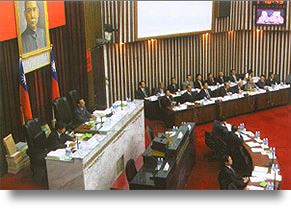A. Resolution

- Regulations for the municipality.
- Budgets for the municipality.
- Collection of exceptional taxes, extraordinary taxes, and surcharges.
- Disposition of municipal property.
- Self-government articles governing the organization of the municipal government and its subordinate business organizations.
- Bill proposals submitted by the municipal government.
- Audit reports on financial statements of the municipal government.
- Bill proposals submitted by councilors
B. Investigation
To clarify certain problematic cases, a task force can be authorized by the council assembly to carry out necessary investigations. A task force designated by the assembly or appointed by the speaker consists of 3 to 7 members. An investigation report has to be submitted to the assembly in 6 months, another 6 months can be extended if necessary.
C. Hearing and Interpellation
During regular council sessions, the Mayor shall report on the administrative directions, the implementation process and results of resolutions passed at the previous council session, as well as the state of administration, and answer interpellation. Level-one department heads and chiefs of the city government should also be present to report on the state of business practice and to answer interpellation.
D. Right to Propose
Councilors can make proposals to request the city government to do or not to do certain administrative activities. A proposal must be co-signed by at least 2 other councilors. At least 4 co-signers are required if the proposal is made to deal with emergent issues. The city government is responsible to carry out the resolutions passed by the council. Should there be problems that make a resolution not feasible, a veto procedure must be started.
E. Right to Receive Citizen Petitions
Citizens are entitled by law to petition the Council verbally or in written; a petition becomes a proposal after receiving and passing committee review.
D. Right to Hold Public Hearings
The Council may hold public hearings to collect opinions from relevant authorities, interest groups, persons involved, experts and scholars so as to help reviewing and resolving important proposals.
F. Other authorities granted by the law, laws and regulations set by higher-level administration, or rules and regulations set by the council.